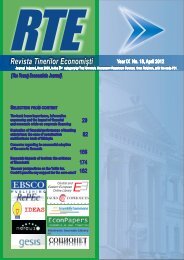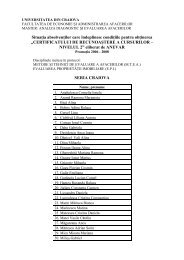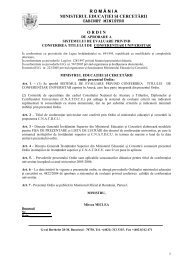Implications of change management in public administration
Implications of change management in public administration
Implications of change management in public administration
Create successful ePaper yourself
Turn your PDF publications into a flip-book with our unique Google optimized e-Paper software.
Economic Theories – International Economic Relations<br />
operators have taken new shapes. These structural <strong>change</strong>s which have essentially<br />
<strong>change</strong>s the world economic landscape relied on three ma<strong>in</strong> events:<br />
- American deregulation, launched <strong>in</strong> the 80s which made all the etatist barriers<br />
falls;<br />
- The downfall <strong>of</strong> the economic <strong>management</strong> communist systems;<br />
- The burst <strong>of</strong> <strong>in</strong>ternet which has led to a revolution <strong>in</strong> telecommunications,<br />
with effects on the organized f<strong>in</strong>ancial markets, modify<strong>in</strong>g the behavior <strong>of</strong> the banks<br />
and <strong>of</strong> all its users.<br />
At the same time, the globalization <strong>of</strong> the markets has determ<strong>in</strong>ed a<br />
globalization <strong>of</strong> market<strong>in</strong>g. Global market<strong>in</strong>g refers to the encouragement <strong>of</strong> the<br />
research <strong>in</strong>itiatives <strong>of</strong> f<strong>in</strong>d<strong>in</strong>g new markets segments or niche all over the world, the<br />
capitalization <strong>of</strong> the buy<strong>in</strong>g and sell<strong>in</strong>g opportunities <strong>of</strong> the products and services<br />
<strong>in</strong>ternationally. The market globalization has triggered a phenomenon <strong>of</strong><br />
<strong>in</strong>dividualization <strong>of</strong> the consumer‟s needs. For example, <strong>in</strong> the context <strong>of</strong> the s<strong>in</strong>gle<br />
<strong>in</strong>ternal European market the consumer is look<strong>in</strong>g more and more for the ”European”<br />
product, <strong>in</strong>ternationally and not nationally. Under the <strong>in</strong>fluence <strong>of</strong> the economic<br />
<strong>change</strong>s, the consumer which was used to the local products gradually becomes more<br />
open for foreign products. The producers, <strong>in</strong> their turn, are transformed <strong>in</strong> mult<strong>in</strong>ational<br />
companies.<br />
In the context <strong>of</strong> these tendencies, a new type <strong>of</strong> European market<strong>in</strong>g is<br />
def<strong>in</strong>ed, the European countries adapt<strong>in</strong>g their production and trade strategies <strong>in</strong> order<br />
to take advantage <strong>of</strong> the new opportunities as much as possible. The strategy relies on<br />
the delimitation <strong>of</strong> the new markets, which are re-grouped on more countries or regions,<br />
especially those situated on the border with the former national markets. Gradually, the<br />
commercial policy <strong>of</strong> the enterprise will pass from the segmentation <strong>of</strong> the national<br />
markets to a transnational segmentation <strong>in</strong> order to reach consumers with identical<br />
behavior <strong>in</strong> many countries. The pair product-market passes from the national<br />
dimension to the European and even <strong>in</strong>ternational dimension. Will appear gradually, for<br />
some products, the transnational niche, i.e. segments where the consumer is the same<br />
for more countries.<br />
At the same time, production will not be standardized any more, but flexible.<br />
The enterprise will no longer be considered isolated; it will have very flexible relations<br />
with the suppliers and the distributors. The computer-based design, the flexible<br />
workshops will allow producers to meet the chang<strong>in</strong>g needs <strong>of</strong> the customers. The<br />
<strong>in</strong>troduction <strong>of</strong> the products on the market will not be reserved only for the specialized<br />
salesmen, but their responsibilities will be split among the other categories <strong>of</strong> staff <strong>of</strong><br />
the enterprise which become <strong>in</strong> this way part-time marketers. The development <strong>of</strong><br />
production will be made on regions <strong>of</strong> the world, and a series <strong>of</strong> standardized<br />
component will allow the production <strong>of</strong> an entire family <strong>of</strong> products.<br />
We can argue that <strong>in</strong> this context, <strong>of</strong> the new type <strong>of</strong> market<strong>in</strong>g, the features <strong>of</strong><br />
the competitiveness concept become more and more complex. An <strong>in</strong>creas<strong>in</strong>g attention<br />
is given to the phenomenon <strong>of</strong> external promotion <strong>of</strong> goods and services manufacture <strong>in</strong><br />
a country, <strong>of</strong> implement<strong>in</strong>g their own <strong>in</strong>vestments <strong>in</strong> foreign territories, <strong>in</strong> order to<br />
impose the national cultural values <strong>in</strong> the <strong>in</strong>ternational arena, us<strong>in</strong>g a certa<strong>in</strong><br />
”aggression” on the world markets <strong>in</strong> the fight for w<strong>in</strong>n<strong>in</strong>g the more consistent market<br />
segments. On the other hand, we can experience nowadays an openness <strong>of</strong> the markets<br />
towards the world competitiveness, through the liberalization <strong>of</strong> the <strong>in</strong>terface systems<br />
117















